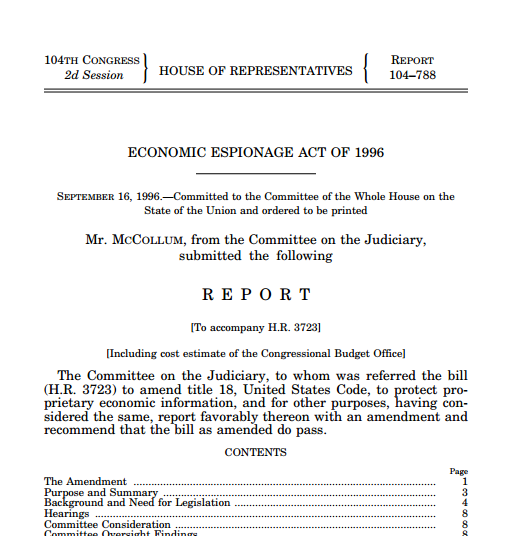

Let's use a legal problem to illustrate the steps to finding legislative history documents. This example is focused on Federal legislative history; the process can be similar for state legislative history.
Imagine you are a new associate at the small to mid-size law firm, Burns, Berns, Birnz, and Ashe.
The first day you're there your managing partner, Ms. Ashe approaches you and says:
"In order to celebrate your new job, one of our clients, Bella Braumeisterin, has gotten herself arrested."
"She has been charged with the federal crime of economic espionage for allegedly selling the recipe for the Champaigne of Beers to a Japanese brewery. I'm looking into the caselaw related to this statute. Since your research prof was one of your glowing references, I want you to find the legislative history."
Researching legislative history starts with what we know--usually the section of statutory code in which we are interested. Then we work backwards through the legislative process.
What do we do know? Bella was charged with a federal crime called "economic espionage." This is probably enough for us to find the statute.
First, go to Westlaw or Lexis and search in United States Code for "economic espionage" In either case, the search will probably return 18 U.S.C. 1831 at the top of the list.
Clicking on "18 U.S.C. §1831" will bring us to the statute page.
Scrolling to the bottom brings us to the "credit(s)" section on Westlaw or the "History" section on Lexis where the information about which session law is the source for this code section.

Here the references are to Pub. L 104-294, 110 Stat 3488 and Pub. L. 112-269, 126 Stat. 2442.
Pub. L. 104-294, 110 Stat 3488 is where this section of code first originated. A few years later, in Pub. L. 112-269, 126 Stat 2442, congress amended §1831.
We'll use these citations to find other documents produced by the legislative process.
Now we're going to change gears a little. Burns, Berns, Birnz, & Ashe does not subscribe to any commercial legislative history service (yes they do exist) so we're going to use Congress.gov. You can find nearly all recent congressional history documents on Congress.gov. Getting back to our problem we'll find the first public law, 104-294.
Near the middle top of the screen hit browse, then from the "show" menu select the 104th congress.
Scroll down and expand the selection for "laws" and select Public Laws.
Scroll down until you see PL 104-294.
Clicking on H.R. 3723--this is the bill number for PL 104-294--brings us to the bill page which contains links to information about this bill's journey through congress.
The bill page gives us information about this bill's trip through congress. Including different versions of the bill, and congressional actions. The Committees tab has one item under it--let's check it out.


Will this legislative history document mean acquittal for Bella? It doesn't matter because she's a fictional character. The important thing is that you've learned how to find a committee report.
 Confused? Don't be
Confused? Don't be
Step Zero is a short cut.
It's simply this, look for a precompiled legislative history. A few sources exist for precompiled legislative histories. There will not be a precompiled legislative history for the vast majority of statutes. Usually, the only major pieces of legislation will get one, like the Affordable Care Act.
Legislative histories prepared by professionals may have additional materials that may not be obvious to a less experienced researcher, for instance, congressional reports and bills from previous congresses on the same subject.
SIU Law has some legislative histories in print and some are available from HeinOnline.